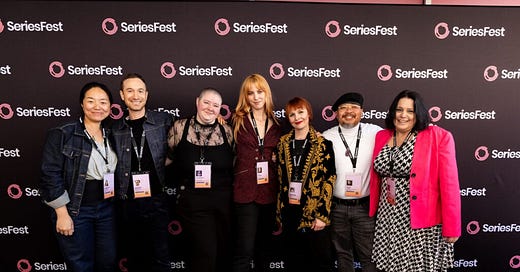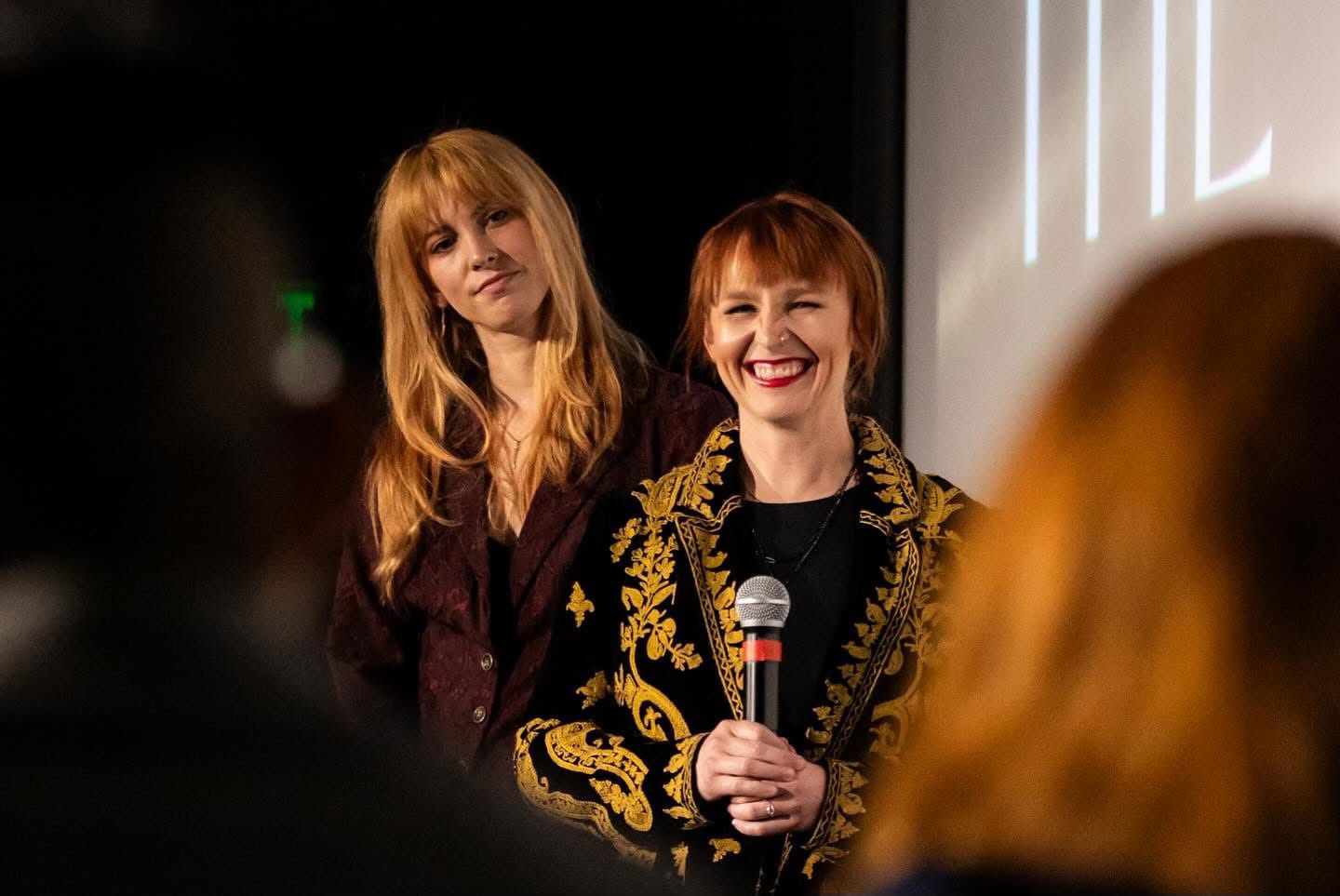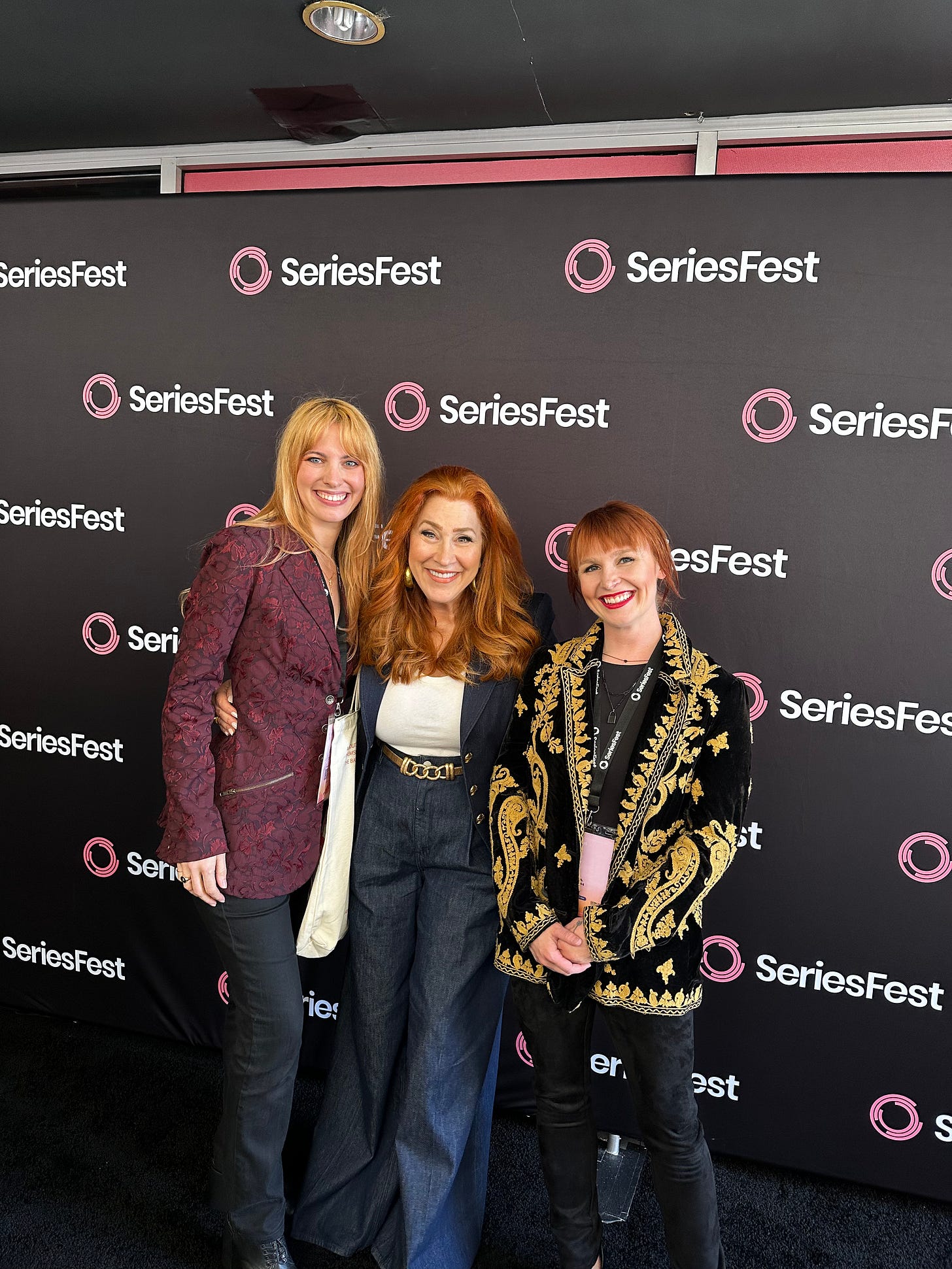SeriesFest takeaways and the future of entertainment
I need 5 business days to nap and get my ducks back in a row.
One of my writing partner’s, C.J. (SeriesFest alum of 2022), described SeriesFest as a creative orgy for six days, followed by a depression hangover.
He was right.
For six days,
and I talked to so many amazing inspiring creatives including our fellow Pitch-A-Thon cohort, meeting celebs, sitting through never-before-seen pilots launching this week by streamers and networks, alumni screenings and talk-backs, panels ranging from A.I to Showrunners, to representation on screen, and parties that rival that time I got to party at John Rich’s mansion in Nashville when I was hired as a burlesque dancer for Big Kenny’s 50th birthday to help his wife deliver and unforgettable birthday performance (peak memory for me).You can tell SeriesFest is a female-founded, female-run festival, because everything about the festival is about one word: connection.
Photo credit: Rebecca Todd of Trubluimages
and I were selected for Pitch-A-Thon and received a month and a half of coaching to prep to pitch in front of three jurors, including a sessions on how to use Canva with their team (shoutout to Canva as sponsors for the fest and all the amazing tools they’ve launched for the film industry) and then presented our five minute pitch, with visuals, to a panel of three jurors which included Lisa Ann Walter (I geeked out, she’s incredible), Whitney Fuller from MonkeyPaw Productions (I LOVE what they are making), and Jason Hiro Kim from Good Karma Productions (and we met his mentee - they are both awesome!) After each pitch, we received seven minutes of feedback and questions from the panel which was INVALUABLE. They go in blind, without seeing anything about our projects, so the pitch is fresh.
Let me know if you want me to dive into what we learned from Pitch-A-Thon and coaching in a separate Substack!
We had an amazing experience and had at least a day or two, or the full festival, to connect with the jurors and other creatives. All of that being said, there was a disconnect between the executive panels and the alumni panels of those who went from “I pitched or my pilot was at SeriesFest years ago to now I have a full show on X platform.” In one breath we would hear how much they love new ideas and want to support creators, but in the next breath, would rarely give a new writer a chance unless you have a seasoned show runner attached.
I’m going to break this into a post per point since there was SO MUCH packed into six days. Like, truly. 16 hour days. I’ve never socialized that much since COVID, but I think it’s worth exploring the intersections and all the new information and trends (and tone deafness of some) we experienced.
Here are some of the main takeaways:
A.I. isn’t going anywhere.
There is a huge disconnect between the execs and those that have been in the industry versus the “new creators.”
Create your IP Universe
Audiences want vulnerability, no matter what medium or platform you are creating for (and many creators stories are based on their own lives)
Comedy is on the rise while we live in hell
Brands and companies are the new key to your financing
You cannot just be an actor anymore
On Day 5, there was a panel with Duncan Crab-Tree Ireland from SAG-AFTRA, Nicola Todorovic the Co-founder of Wonder-Dynamics and Scott Mann the Co-CEO and Founder of Flawless.
If you haven’t seen Flawless AI yet, this is your last scream to look at their site and tools. We saw multiple demos, and the seamlessness and perfection is unreal. This is from their site, what Flawless AI does:
DeepEditor- Unleashes elemental editing, copy, paste and edit cinematic performances, remove the need for reshoots, easily adjust and create new takes and new lines of dialogue.
Truesync- a fix for film dubbing. Cinematic lip-syncing in over 30 languages. Global cinema at scale.
Artistic Rights Treasury (A.R.T.) allows studios and artists to protect their rights. Keeping art human.
As a filmmaker, it is INCREDIBLE that these tools can exist to make production possible for the little guy (or the little liege for gender-friendly) and complete higher concept projects. Reshoot days can completely blow a budget, especially with big scenes, stunts, special effects, trying to re-arrange travel, so being able to use this to finish a film is amazing. It speeds up the process as well, which is important in this entertainment environment where trends and predictions and what thrives versus flop can change drastically based on what is happening. By time you raise money, develop, film, and go into post-production, the “Why Now?” idea you have may not land in the same way.
As an actor, I have a lot of questions, now raised by Duncan and SAG-AFTRA of yes, like when the talkies emerged, we couldn’t suddenly stuff them back in a bottle and go back to the silent film era, in the same way AI is not going back in the bottle, BUT in watching them show us how we can approve all these changes made to us, all I could think was - Is this my acting career forever now? Just watching myself and signing off on all these changes made to me by AI tools?
And most importantly - reshoot days are a HUGE point of insurance and can make or break someone making what they need to qualify for insurance that year. Will I be paid every time I am sent something to watch and sign off on? Because that is TIME. Actors are already asked so much - auditioning for free sometimes 10,20,50,100,1000 times before booking a job. Learning all of the lines and studying for the character without being paid for those days. All the time refining craft.
Also what if I don’t sign off on the change? Who overrules who? The producer? The studio?
Let’s be clear: I so appreciate that SAG-AFTRA has defined AI to some extent for actors, and at least avoided the “in perpetuity” fear that so many of us have, but as things continue to be squeeze in this late-stage capitalistic hellscape, I worry that actors will take a huge hit in this (not to mention all the production crew, post production crew, VFX, etc that will also lose days of work and be affected). Will this mean more productions if creators and studios can save? Will this mean less time between seasons to speed up the post-production process?
If you’ve ever wanted to make affordable animation, Wonder Dynamics (now acquired by Autodesk) makes that possible. Animation is such a powerful form of storytelling, not only for children, but adults as well. Instead of weeks or months filming mo-cap in a green screen studio, all you need is your iPhone (or a better camera if you want) and it will create the animation with your movements. Can you imagine Avatar using this? What the difference in budget would be?
As a creator and filmmaker, the possibilities feel endless. Looking at these tools, I don’t have to only think with “shoot with what you know” which usually ends up being a drama, comedy, or horror film mostly set in a house because other locations are too expensive to obtain, but I can dream beyond those realms and dream bigger.
The genie isn’t going back in the bottle. But what does give me hope, is that no matter what, and the resonating theme throughout SeriesFest, is that the stories that stick, whether it is on broadcast TV, the streamers, or Tiktok, are the stories that tap into our most human asset: vulnerability.
More to come <3






